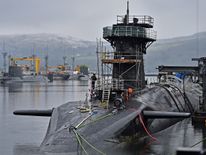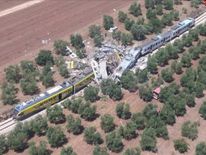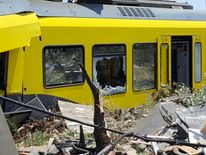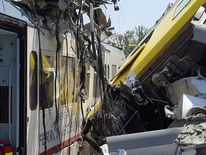Within hours of becoming Prime Minister, Theresa May will be given a security briefing from the Cabinet Secretary, National Security Adviser and Chief of the Defence Staff.
Having just returned from Buckingham Palace and addressed the nation in Downing Street, this will be the moment that the true enormity of her appointment sinks in.
Tony Blair was said to have turned "quite white" as he sat in Downing Street and listened to the responsibility now on his shoulders.
The three men will bring Mrs May up to speed on the UK's secret military deployments.
Specifically, she will be told the whereabouts of the Royal Navy's on-duty nuclear submarine.
HMS Vigilant
Although normally on patrol somewhere in the North Atlantic, her exact whereabouts is known only by a handful of people.
Even most of the crew on board are unaware.
The new Prime Minister will then be asked to make probably the gravest decision of her premiership.
A decision that she will never live to witness.
She must decide how she wants the military to react in the event of nuclear war.
Her instructions will only be acted out if she, and her entire Cabinet, has been wiped out.
Mrs May will be given four options:
1. To retaliate.
2. To do nothing.
3. To place the submarine under the control of an ally - specifically the United States Navy or Royal Australian Navy.
4. To act according to how the Captain deems best.
She will be left alone to consider her options. It won't be easy.
Think about it yourself for a minute. What would you do?
Your first reaction might be to retaliate, to hit back at the aggressor.
Bear in mind though, that by then, the nuclear deterrent would have failed.
It would have failed to do what it was designed to do: deter.
And your posthumous order would mean tens of thousands of innocent people would die.
Gosh, that requires pause for thought.
Once decided, Mrs May will write four handwritten letters.
They will be addressed to the Commanders of the four Vanguard class submarines.
They will be delivered to the boats and locked away.
David Cameron's letters, which were written when he took office, will be burned without being opened.
Unless he decides to tell us, we will never know what his decision was.
Only one Prime Minister has revealed that secret.
James Callaghan told the historian Peter Hennessy: "If we had got to that point, where it was, I felt, necessary to do it, then I would have done it.
"I've had terrible doubts, of course, about this.
"I say to you, if I had lived after having pressed that button, I could never ever have forgiven myself."
It is a decision, like no other.









